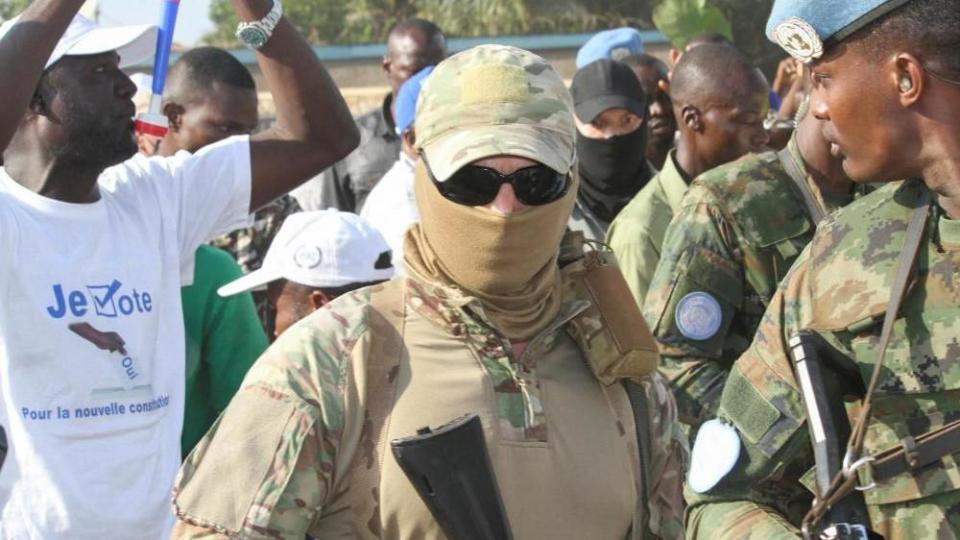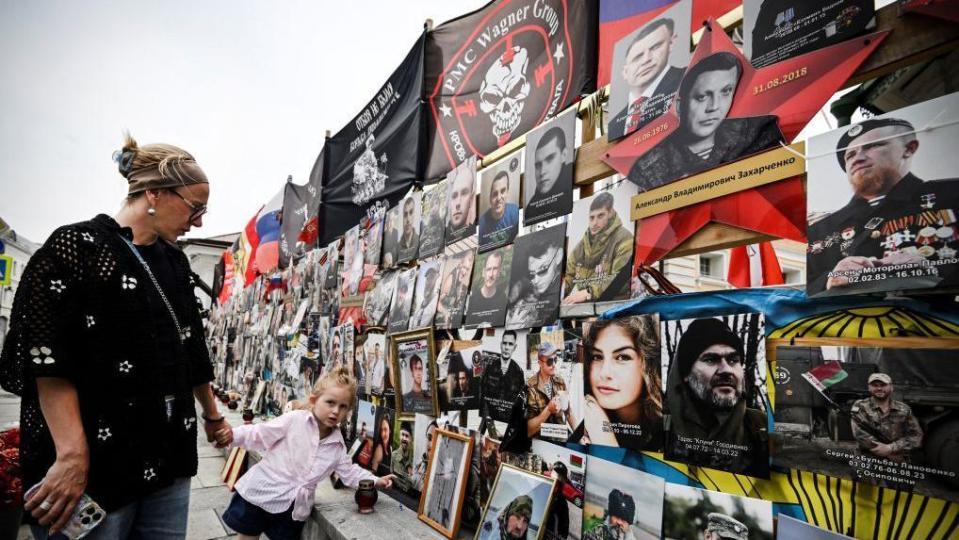Russia has effectively dismantled and replaced the Wagner Group in the year since the mercenaries shocked the world by launching a mutiny against President Vladimir Putingovernment, experts told the BBC.
Yevgeny Prigozhin – the late leader of the paramilitary force – fled Ukraine on June 23, 2023 and seized the southern city of Rostov after months of escalating tensions with military leaders in Moscow.
His forces then began a brief attack on the capital, practically encountering no resistance. The “march for justice,” as Prigozhin called it, came to an abrupt end the next day after he called off the advance.
Just two months later, Prigozhin’s plane crashed and he was killed along with several other senior members of Wagnerthrowing the group’s future into uncertainty.
Dr Sorcha MacLeod, a member of the UN working group on mercenaries and a professor at the University of Copenhagen, said Wagner’s former troops had fragmented across the Russian state.
“[Wagner] It may not exist in exactly the form that it previously existed, but a version – or even versions – of it continues to exist,” she told the BBC. “There has been this kind of dispersion among the Russian state, so that there is no overall controller. “
“The Wagner Group was incredibly important geopolitically and economically for Russia, so it was never going to disappear, as some people have suggested,” he added.
For years, Prigozhin’s forces were a valuable and deniable tool for Russian operations in Africa and Syria. But it was in Ukraine – as Moscow’s conventional forces fought to undermine Kiev’s defenses – that Prigozhin and Wagner came to the fore.
Throughout late 2022 and early 2023, Wagner was instrumental in Russia’s few battlefield victories. His forces – made up largely of former prisoners – managed to take the eastern town of Soledar, before it was entrenched in months of intense fighting in Bakhmut’s meat grinder.
At his peak, Wagner had about 50,000 mercenaries in Ukraine, according to the US National Security Council.
Now experts say Wagner’s operations in Ukraine have been subsumed by other Russian state and paramilitary units. A former Wagner commander recently told BBC Russian that the mercenaries were ordered to “join the Ministry of Defense” or leave.
UK intelligence officials have suggested that some of the group’s infantry units were included in the Rosgvardia, or Home Guard. The unit, created in 2016, has been described as Putin’s “private army” and is controlled by his former bodyguard, Viktor Zolotov.
The UK Ministry of Defense (MoD) said elements of the Wagner Group would begin coming under the control of the Home Guard in October 2023. Called “voluntary formations”, former Wagner troops would be sent to Ukraine on contract contracts. six months. and to Africa with nine-month contracts, he said.
Anton Yelizarov – a longtime Wagner operator who is said to have commanded the mercenaries’ bloody operations in Bakhmut – appeared to confirm the integration days later. In a video published on a Telegram channel linked to Wagner, he said he was present at the construction of a camp where Wagner troops would “work for the good of Russia” and join National Guard units in a new formation.
UK officials said the “incorporation of former Wagner assault detachments into the Russian Guard Volunteer Corps most likely indicated that Wagner was successfully subordinated to the Russian Guard, increasing Russian state control over the Wagner Group.”
Other ex-Wagner forces have signed up to fight Vladimir Putin’s strongman in Chechnya – Ramzan Kadyrov – and his Akhmat forces, a recent BBC Russian investigation has revealed.
A tangible example of the group’s decline occurred when its logo was allegedly removed from the building it occupied in Russia’s second largest city, Saint Petersburg.

In the days following the mutiny, Prigozhin reportedly made an agreement with Putin to concentrate his group’s operations in Africa, supporting regimes and securing resources for Russia. After his death, Deputy Defense Minister Yunus-Bek Yevkurov reportedly visited African capitals, assuring authorities that the services provided by the group would not dissipate.
Earlier this month, the Polish Institute of International Affairs (PISM) think tank noted that following Prigozhin’s death, “the Russian state’s attention on [Africa] not only did it not weaken, but it strengthened.”
In February, the BBC obtained documents revealing that Moscow was offering a “regime survival package” in exchange for access to strategically important natural resources – an approach previously favored by the Wagner Group.
The plan was being offered by a so-called Russian “expeditionary group” – nicknamed the Africa Corps – and commanded by former GRU Gen Andrey Averyanov. Previously, he oversaw covert operations specializing in targeted assassinations and destabilization of foreign governments.
Experts told the BBC that the Africa Corps effectively replaced Wagner in West Africa. On Telegram, the unit boasted of offering recruits salaries of up to 110 thousand rubles per year and service “under the leadership of competent commanders with extensive combat experience.”
In January, it announced the first deployment of 100 soldiers to Burkina Faso. Another 100 reportedly arrived in Niger in April.
Ruslan Trad, a security analyst at the Atlantic Council, told the BBC that, in effect, Wagner “has become the Africa Corps and now serves all the purposes of military intelligence” and the Ministry of Defense.
“In Africa, these soldiers are doing practically the same thing – protecting trade routes, securing the resources that Moscow uses to circumvent sanctions and much more – serving local councils and guiding the flow of migrants,” he noted.
PISM noted that the Africa Corps is intended to be used “more openly” than Wagner on the continent, with the intention of replacing Western – and particularly French – influence in Africa.
The Russian BBC reported that only in the Central African Republic (CAR) does Wagner still operate under any shadow of its former form, allegedly controlled by Prigozhin’s son Pavel.
“Moscow has given the heir the green light to continue doing what his father did in Africa, as long as it does not contradict Russia’s interests,” a source who worked with Yevgeny Prigozhin told BBC Russian.


Last week, Le Monde reported that around 1,500 Wagner soldiers helped local security forces in attacks on rebel-held areas.
However, PISM noted that the CAR’s overall importance in Moscow’s strategic thinking “is waning”.
Dr. MacLeod suggested that Wagner’s original aim at CAR was to show a “proof of concept” that mercenary groups can be “used as successful actors in the fight against terrorism”, a goal that Moscow can now see as having been achieved.
But he added that Wagner was “totally enmeshed” in the CAR, making it more difficult to replace him with the new developing Africa Corps.
Despite the threat posed by the Prigozhin mutiny, Sunday’s anniversary passed largely without incident in Russia.
Dan Storyev of the monitoring group OVD-Info told the BBC that Prigozhin’s legacy lies primarily with those aligned with the Kremlin.
“Overall, the Wagner mutiny didn’t have much, if any, real popular support for there to be, say, mass rallies to mark the anniversary – perhaps because there was no genuine anti-war message,” he noted. he.
“There are people who organize protests in Russia, but they are focused on anti-war activism and have nothing to do with [Prigozhin].”





































